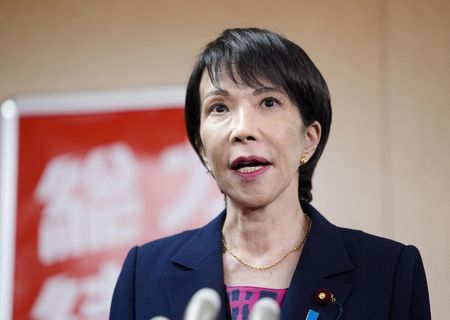TOKYO (Reuters) -Japan’s parliament failed to set a date for its vote on a new prime minister on Wednesday, after party leaders spent a day in inconclusive coalition talks.
The ruling Liberal Democratic Party has proposed a vote on October 21 to the parliamentary scheduling committee, but opposition parties have not agreed to that date, citing ongoing coalition discussions across parties.
The LDP chose Sanae Takaichi as its new chief earlier this month, but her path to becoming Japan’s first female prime minister has become trickier after the party’s longstanding partner Komeito chose to end their coalition last week, opening up the possibility of the next premier coming from one of the opposition parties.
The biggest opposition group, the Constitutional Democratic Party, is trying to put together a coalition with the Democratic Party For the People and the Japan Innovation Party, to put DPFP leader Yuichiro Tamaki forward for the premiership.
But the three parties’ leaders reached no conclusion in talks on Wednesday, and Tamaki also met with the LDP’s Takaichi.
“There’s still some distance between us and the CDP,” Tamaki told reporters after their meeting lasting about an hour. He added that another leaders’ meeting could be held as late as next Monday if they can iron out their differences by then.
Tamaki said Takaichi had also asked him for his support.
“I understood (from the meeting) that she was proposing a coalition with us,” Tamaki said. “She said she wanted me to share the responsibility, and her asking me to write her name in the vote for prime minister to me meant that she was asking for a coalition.”
Takaichi also met the Japan Innovation Party’s leaders and asked for their support for the premiership vote and proposed a coalition. They agreed to start talks on policies from Thursday.
“We will vote for her if we agree in policy talks,” said Japan Innovation Party leader Hirofumi Yoshimura, adding that his party would make its decision by next Monday.
The LDP, which has ruled Japan for most of the postwar period, has lost its majority in both the lower and upper houses in elections since last year, leading Prime Minister Shigeru Ishiba to announce his resignation. It remains the largest party in both chambers, however.
(Reporting by Kantaro Komiya, Kaori Kaneko and Mariko KatsumuraEditing by Chang-Ran Kim)











